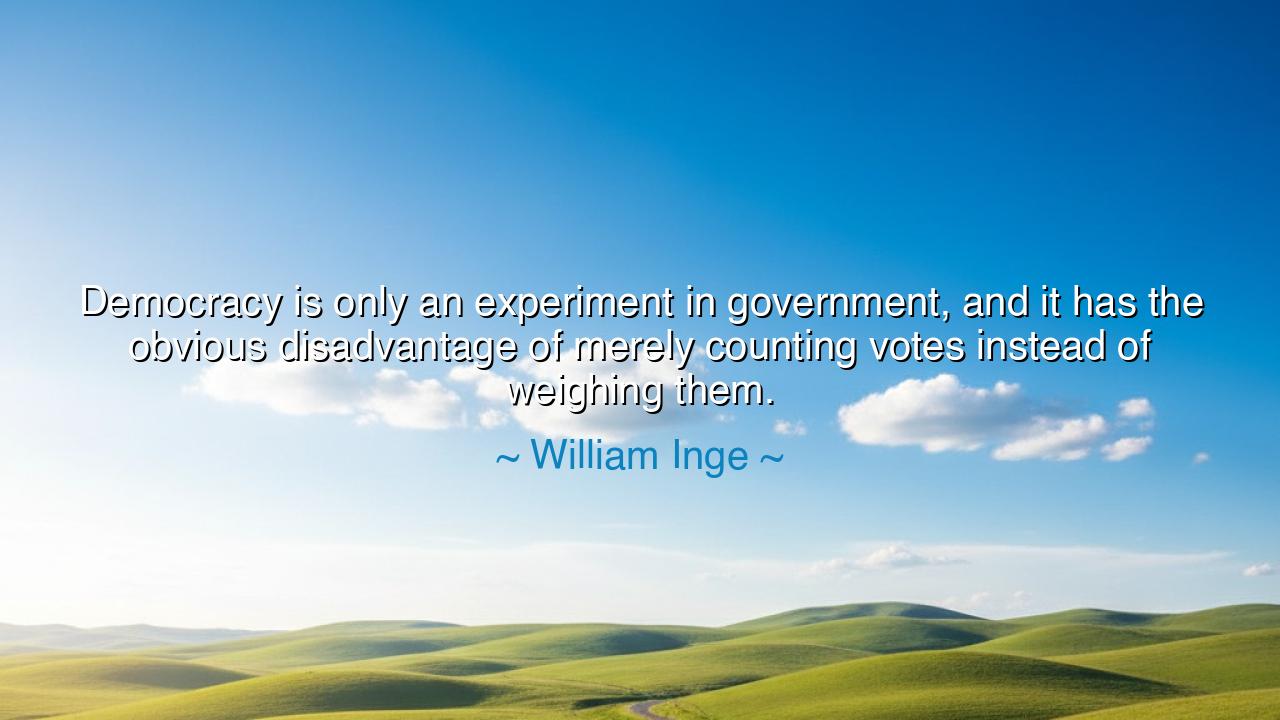
Democracy is only an experiment in government, and it has the
Democracy is only an experiment in government, and it has the obvious disadvantage of merely counting votes instead of weighing them.






Hearken, children of reason and seekers of wisdom, to the words of William Inge, who spoke with piercing discernment: "Democracy is only an experiment in government, and it has the obvious disadvantage of merely counting votes instead of weighing them." In this reflection lies a profound meditation on governance, judgment, and the delicate balance between equality and wisdom. Inge reminds us that democracy, though noble in intent, is a system ever in flux, tested by time, circumstance, and the minds of its citizens.
The origin of Inge’s insight emerges from observation of the democratic experiment, where the power of the people is exercised through votes, yet the complexity of justice, prudence, and policy cannot be fully captured by mere numbers. Democracy grants equal voice to all, but equal voice does not always translate into equal understanding or discernment. Here Inge reveals a subtle paradox: the measure of governance requires more than tallying consent—it demands reflection, reasoning, and judgment.
Consider the imagery he evokes. To “count votes” is to reduce decision-making to arithmetic, to measure power by quantity rather than quality. To “weigh votes” would be to account for wisdom, knowledge, and foresight, acknowledging that governance is not merely the expression of majority, but the careful harmonization of interests, rights, and long-term consequences. Inge’s observation calls upon citizens to recognize that democracy is not infallible; it is a living experiment requiring vigilance.
History provides vivid exemplars. In ancient Athens, the birthplace of democracy, citizens voted on matters of war, law, and policy, yet even in that celebrated system, the assembly sometimes made decisions that led to disaster, such as the Sicilian Expedition during the Peloponnesian War. Likewise, the election of leaders in other democracies has at times favored popularity over prudence, charisma over competence. In each case, the limitations of simple majority rule became painfully evident, highlighting Inge’s cautionary insight.
Yet democracy’s experimental nature is also its strength. Unlike monarchies or autocracies, where unchecked power may go unchallenged, democracy allows correction through debate, voting, and the peaceful transfer of authority. Inge’s words do not dismiss the value of democracy; rather, they call for an informed, reflective citizenry, one that understands that governance is more than procedure—it is an ongoing experiment that relies on wisdom as much as on numbers.
The lesson is timeless: participation without reflection is hollow, and equality without discernment is fragile. Citizens must engage not merely by marking ballots, but by weighing issues, understanding consequences, and cultivating judgment. A democracy that counts votes alone may falter, but a democracy where citizens think deeply, discuss openly, and act responsibly becomes resilient, just, and enduring.
Practical actions emerge naturally: educate oneself about policies, history, and governance; engage in civic discourse; evaluate candidates and laws not only by popularity but by competence and ethical considerations; and foster communities of deliberation and debate. By doing so, one ensures that democracy is not a mechanical count, but a thoughtful, reasoned, and evolving experiment in collective governance.
In sum, Inge’s wisdom teaches that democracy is at once fragile and magnificent. Its promise lies not in the simplicity of counting votes, but in the engagement of minds and hearts, in the careful weighing of ideas, and in the vigilance of citizens who recognize that freedom and responsibility must always advance hand in hand. Let this lesson guide both rulers and the ruled, so that the experiment of democracy may endure, enlightened by reflection and strengthened by wisdom.
If you wish, I can craft an even more epic, mythic version, turning Inge’s reflection into a heroic narrative about the trials, virtues, and vigilance required in the pursuit of true democratic governance—perfect for immersive audio storytelling. Do you want me to do that?






AAdministratorAdministrator
Welcome, honored guests. Please leave a comment, we will respond soon